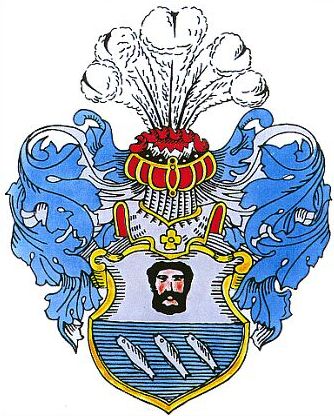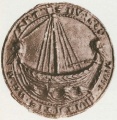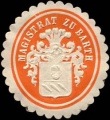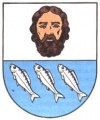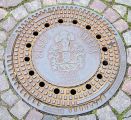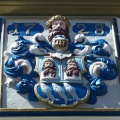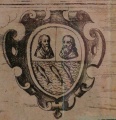Barth: Difference between revisions
Knorrepoes (talk | contribs) m (Text replacement - "{{de1}}↵" to "") |
Knorrepoes (talk | contribs) m (Text replacement - "{{media}}" to " {{de1}} {{media1}}") |
||
| Line 31: | Line 31: | ||
{{ | |||
{{de1}} | |||
{{media1}} | |||
[[Civic Heraldry Literature - Germany|'''Literature''']]: Bensing, et al 1985; Ewe, 1972 | [[Civic Heraldry Literature - Germany|'''Literature''']]: Bensing, et al 1985; Ewe, 1972 | ||
Revision as of 12:20, 26 December 2022
This page is part of the German heraldry portal Deutsche Wappensammlung |
Heraldry of the World |
|
German heraldry:
|
Selected collector's items from Germany:
|
BARTH
State : Mecklenburg-Vorpommern
District (Kreis) : Vorpommern-Rügen (1994-2011 Nordvorpommern,until 1994 Ribnitz-Damgarten)
| German |
Geteilt; oben in Silber ein hersehender braun behaarter und bebarteter Mannskopf; unten in Blau drei schrägrechte silberne Fische, balkenweise gestellt. Auf dem Schild ein blau-silbern bewulsteter Bügelhelm mit goldenem Halskleinod und blau-silbernen Decken, geschmückt mit fünf silbernen Straußenfedern Origin/meaningBarth grew around a castle of the Princes of Rügen, built around 1200. In 1225 a Earl of Barth was mentioned, in 1232 the town itself. In the late 13th century Barth received city rights. The arms show in the upper part a head, with a canting beard (Bart). The head already appears on a seal from 1404. The meaning or date of addition of the three fish is not known. The oldest seal of the city is known from around 1300 and only shows a ship with two bearded heads on each end.
Literature: Bensing, et al 1985; Ewe, 1972 |


